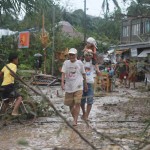 The terrible typhoon that hit the Philippines last week has rightly been the main news topic over the last few days, with terrible images beamed worldwide of the carnage nature has wrought upon the island community. In many ways it bought chilling reminders of the tsunami that struck south-east Asia in 2004.
The terrible typhoon that hit the Philippines last week has rightly been the main news topic over the last few days, with terrible images beamed worldwide of the carnage nature has wrought upon the island community. In many ways it bought chilling reminders of the tsunami that struck south-east Asia in 2004.
As a company, IBM were one of the first to respond to that disaster. Their response, outlined in this document, was said to be worth over $3 million, and saw technology and manpower donated to the relief effort by the company. This was just the formal company effort, with IBM employees also rallying round to donate money and goods to be sent out to the disaster zones. The response is part of a company wide drive to be good global citizens.
“IBM has a tradition of responding whenever there’s a disaster, whenever there’s a significant occurrence in one of the communities where we live and work,” says Robin Willner, IBM’s vice president of Global Community Initiatives. “That’s part of being a good corporate citizen.”
Which brings me to the current situation. One could argue that the greatest Filipino export is that of its nurses. It’s believed that as many as 150,000 Filipino nurses currently work abroad, or 85% of the total number. A large number of these currently work in the UK National Health Service (NHS).
Whilst the initial UK response to the disaster saw 2 NHS employees sent to the area to assist with the rescue and recovery process, I can’t help but wonder if more couldn’t have been done, especially with such a large Filipino community working in the UK health service. I wrote only last month about the beneficial impact allowing employees to volunteer for good causes has on employee engagement and productivity.
The researchers found that the volunteers felt more connected to others, competent, and in control of their lives after volunteering. Equivalent effects were found for psychological detachment and mastery experiences: volunteering helped to shrug off workplace concerns and gave opportunities to meet challenges. These benefits also carried through into their work the following day. The volunteers were found to be happier at work and were better active listeners. It proved particularly effective at cushioning the stresses of office life.
Allowing even a small portion of the Filipino nurses currently working in the NHS to go home and help with the relief efforts would I’m sure make a huge difference. The NHS is beginning to export its services overseas in a commercial sense, but this would offer a real opportunity to do so in a more meaningful way too.
What do you think? How would your employer react in such a circumstance?
Interesting idea. I'd imagine the NHS would be decimated though if you allowed even a portion of the Filipino staff to return home to help out their homeland.
Even something like having fundraisers or a hotline to help staff with family in the affected areas would be a nice gesture. I'm sure the Filipino staff are very concerned about what's happening back home.
It would of course be a big ask, but that would be a heck of a statement of intent by them.
Caesars Palace has approved plans for a 3 billion dollar resort in the Philippines. We saw an opportunity and we went for it. We intend to make a positive out of a negative. We look forward to working with the Philippines people. We will employ the local population and give out free buffet cards as needed in the future. We will comp all the locals with free slot play. Construction will start in 2014 to 2015. The presidential suite will cost over 100 million dollars to furnish.
Just what the region needs I'm sure.